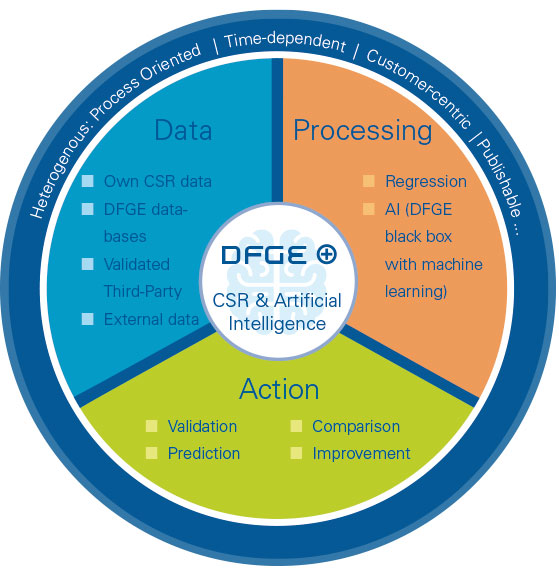CSR and Artificial Intelligence
Sustainability Intelligence
Artificial intelligence (AI) is changing the economy and our lives. At DFGE, we therefore began to explore the possibilities of machine learning, especially neural networks, several years ago. The result are business cases that help to evaluate collected data in an automated way and provide new insights for the optimization of your CSR.
Dr.-Ing. Thomas Fleissner
Gounder and CEO of DFGE
We have been dealing with fact-based corporate sustainability for a long time. Therefore, it makes sense to try out new methods here. Imagine the opportunities that arise when you collect a large amount of different CSR data in a Big Data approach, evaluate them with Machine Learning, and gain new insights for your CSR management!”
- Sustainability Intelligence at DFGE
- History and Philosophy of DFGE
- Stay up to date with our DFGE Blog
Business Cases der DFGE Künstliche Intelligenz Lösungen
Improve CSR in your business
- Reviewing your CSR data will increase the resilience of your CSR statements
- Carbon Footprint Benchmarking
- Carbon Footprint-Calculation
- Competitor- and Market-Benchmarks
Expansion of your CSR activities:
- SDG (Sustainable Development Goals) Matching. Gap analysis of your data and your SDG commitment
- Scope 3-Calculation (Corporate and Product Carbon Footprint)
- Applying AI insights to other CSR areas along your value chain, which have not yet been considered yet
Why Artificial Intelligence?
- Keeping an overview even in large amounts of data (big data)
- Recognition of new patterns and derivation of actions
- Connecting very different data sources
CSR & AI
Our Approach to Artificial Intelligence in CSR
In the “model of three columns” of CSR (Corporate Social Responsibility), economy, ecology and social issues are of equal rank and weight, both on the macroeconomic and political level, as well as on the global and corporate level. Companies generate vast amounts of data in all these areas. Both this own data and validated external data from third parties, as well as other data that (at least at first glance) have no direct connection with CSR, are collected in the AI concept of DFGE ®.
Data Collection
- Own company-wide data
- Databases of DFGE
- Competitor / Market Data
- External validated databases
- Further data, also from non-thematic areas
AI-Concept of DFGE ®:
- Expertise in the selection of usable data
- Validation of internal and external data
- Own database of DFGE from carbon footprint and CSR projects over the last 20 years
This step requires a sound understanding of how machine learning works and which methods are appropriate for solving a specific problem. After selecting suitable models, they are further optimized in an iterative process until the result satisfies the quality criteria defined before for the application.
Processing
- Mathematical regression
- Selection of an appropriate AI algorithm for the problem
- Training the AI model
- Iterative improvements of the model hyperparameters
AI-Concept of DFGE ®:
- Many years of experience in regression analysis
- Broad portfolio of AI algorithms
The Artificial Intelligence concept of the DFGE is a hybrid and sequential approach. Therefore, this last step is not just about presenting results, but also about identifying and implementing measures to improve CSR across all three pillars of sustainability.
Action
- Quantified results
- Identification of strengths and weaknesses in the company and / or market
- Derivation of measures: “Action” instead of “Results”
AI-Concept of DFGE ®:
- Derivation of measures from the results
- Methodological extension of DFGE Sustainability Intelligence
- Support and advice regarding implementation




